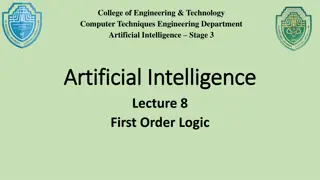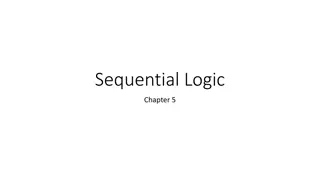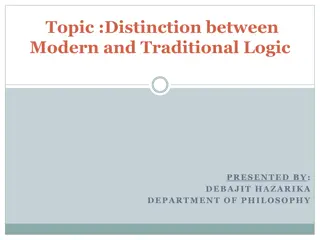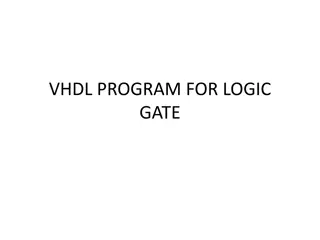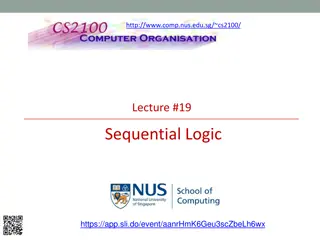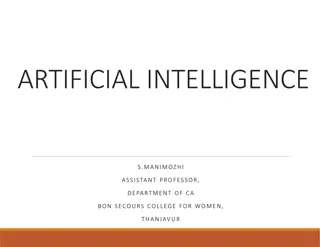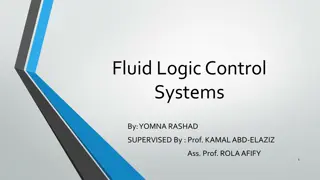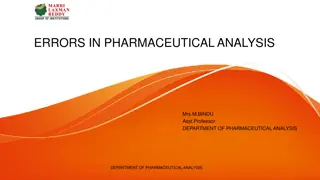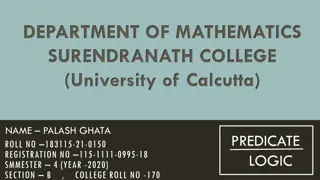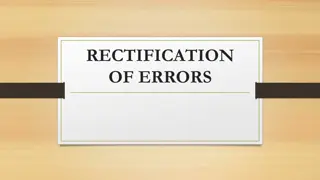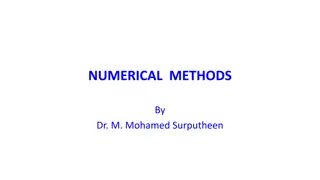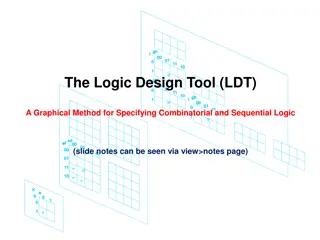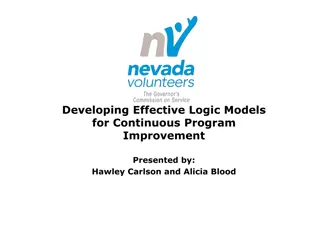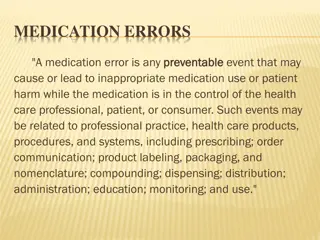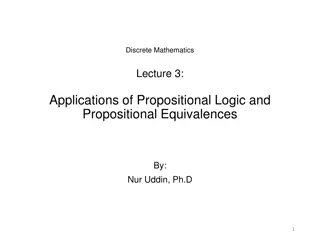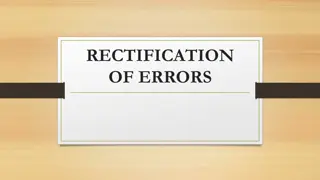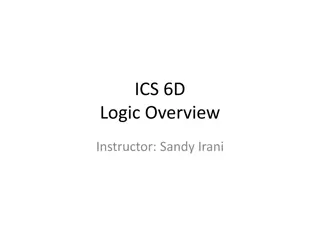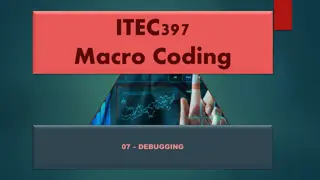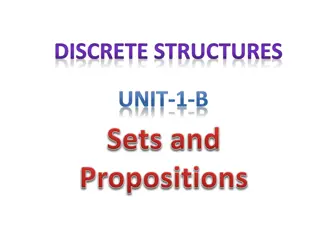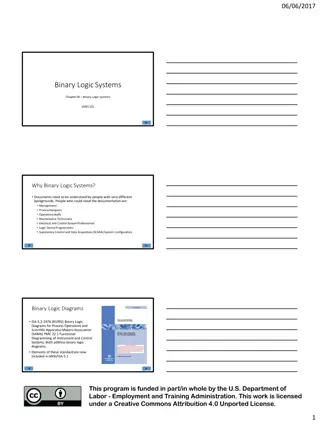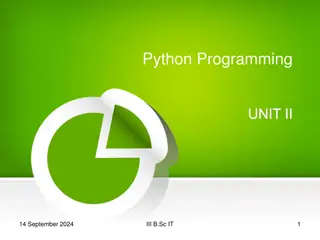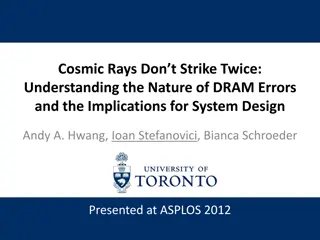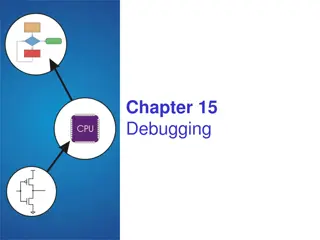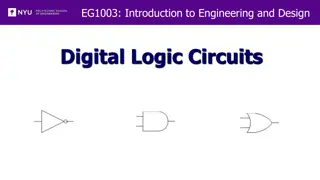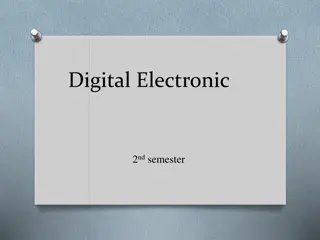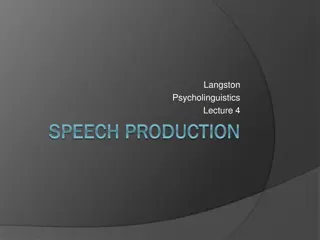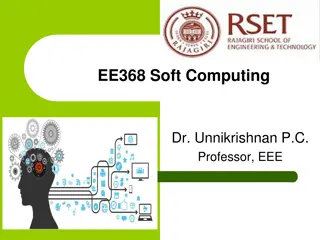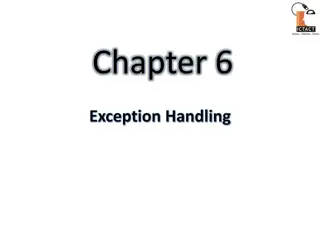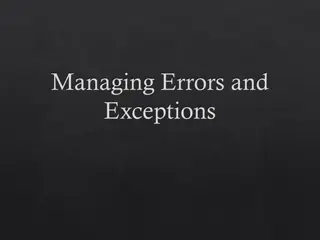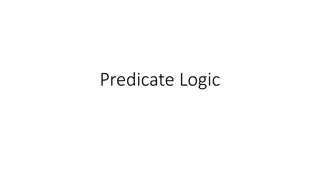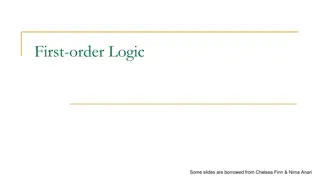Understanding First-Order Logic in Artificial Intelligence
Delve into the realm of first-order logic in artificial intelligence as a knowledge-based agent represents and deduces actions in its operating world. Explore the limitations of propositional logic and the expressive power of first-order logic, along with syntax, semantics, and models in logical lan
3 views • 27 slides
Understanding Sequential Logic Circuits in Digital Systems
Logic circuits in digital systems can be either combinational or sequential. Sequential circuits utilize storage elements along with logic gates, where outputs depend not only on present inputs but also on past inputs and internal states. They are essential building blocks, with storage registers pl
5 views • 20 slides
Topic : Distinction between Modern and Traditional Logic.
Logic, as a normative study, focuses on distinguishing correct reasoning from incorrect. Traditional logic, based on Aristotle's work, emphasized syllogistic reasoning, while modern logic, pioneered by figures like Leibnitz and Russell, employs mathematical methods and symbolic logic for a more adva
2 views • 10 slides
Logic Families
Logic families such as Diode Logic (DL), Resistor-Transistor Logic (RTL), and Diode-Transistor Logic (DTL) each have distinct capabilities and limitations when it comes to performing logic functions. While DL gates are simple and inexpensive but limited in functionality, RTL gates offer both normal
1 views • 22 slides
VHDL Logic Gate Programming Examples
This content provides VHDL code examples for various logic gates including AND, OR, NOT, XOR, and X-NOR gates along with their corresponding circuit diagrams. Each code snippet is accompanied by a brief explanation and a visual representation of the logic operation. The provided VHDL code can be uti
0 views • 7 slides
Understanding Sequential Logic in NUS CS2100 Lecture #19
Explore the concepts of sequential logic in Lecture #19 by Aaron Tan at NUS, covering memory elements, latches, flip-flops, asynchronous inputs, synchronous sequential circuits, and different types of sequential circuits. Delve into the distinction between combinatorial and sequential circuits, memo
3 views • 26 slides
Understanding Predicate Logic in Artificial Intelligence
In the world of artificial intelligence, predicate logic plays a crucial role in representing simple facts. It involves syntax, semantics, and inference procedures to determine the truth value of statements. Real-world facts are represented using propositions in logic, allowing for structured knowle
1 views • 19 slides
Introduction to Fluid Logic Control Systems
Fluid logic control systems utilize devices that switch fluid, like air, between outlets, providing ON/OFF outputs swiftly based on control signals. This article explores moving-part logic devices, control functions, Boolean algebra applications in control technology, and advantages of fluid logic s
1 views • 22 slides
Understanding Errors in Pharmaceutical Analysis
This article explores different types of errors in pharmaceutical analysis, such as determinate and indeterminate errors, and discusses their impact on analysis results. It also covers the concepts of accuracy, precision, and minimizing systematic errors in analytical chemistry. The importance of id
1 views • 37 slides
Understanding Logic Circuits in Aircraft Systems
Aircraft logic systems follow MIL/ANSI standard logic symbols and conventions used in electronic applications. Inverters, buffers, AND gates, OR gates, NAND gates, NOR gates, Exclusive-OR gates, and Exclusive-NOR gates are commonly used in aircraft logic circuits. These gates have specific behaviors
0 views • 52 slides
Introduction to Predicate Logic in Mathematics
Predicate logic is a powerful tool used in mathematics to express complex relationships and assertions that cannot be adequately represented by propositional logic. It allows for the quantification of statements over a range of elements using predicates and quantifiers like universal and existential
1 views • 13 slides
Understanding Exceptions in Computer Science
Errors in programming, such as syntax, semantic, runtime, and logical errors, can disrupt the execution of a program. Syntax errors relate to grammatical violations, semantic errors occur when statements lack meaning, and runtime errors happen during program execution due to illegal operations. By i
1 views • 35 slides
Understanding Rectification of Errors in Accounting
Preparation of trial balance is essential for verifying the accuracy of accounting records, but it is not a conclusive proof of correctness. Rectification of errors is crucial for ensuring the true and fair presentation of a business's financial position. Types of errors include errors of omission,
0 views • 14 slides
Understanding Numerical Methods and Errors in Computation
Delve into the world of numerical methods through the guidance of Dr. M. Mohamed Surputheen. Explore topics such as solving algebraic and transcendental equations, simultaneous linear algebraic equations, interpolation, numerical integration, and solving ordinary differential equations. Learn about
0 views • 130 slides
Importance of The Logic Design Tool (LDT) in Medical Device Software Development
The Logic Design Tool (LDT) is a graphical method that helps prevent logical errors in medical device software development, reducing costs and hazardous failures. A study by NIST revealed that logic errors account for a significant percentage of faults in recalled medical devices over a 15-year peri
0 views • 15 slides
Developing Effective Logic Models for Continuous Program Improvement
Explore the essentials of logic models and their significance in evaluating programs for continuous improvement, presented by Hawley Carlson and Alicia Blood. Learn about theory of change, logic model components, and using logic models for evaluation planning.
4 views • 12 slides
Understanding Medication Errors in Healthcare
Medication errors are preventable mistakes in medication use that can lead to patient harm. Factors contributing to these errors include human-related, system-related, and medication-related issues. Human-related factors involve providers and patients being overworked, under-trained, or distracted,
0 views • 13 slides
Applications and Equivalences in Propositional Logic
This lecture explores applications of propositional logic, including translating sentences, system specifications, logic puzzles, and logic circuits. It also defines tautology, contradiction, and contingency as types of compound propositions, along with logical equivalences. Examples and illustratio
0 views • 16 slides
Understanding and Rectifying Accounting Errors
Preparation of a trial balance helps in checking the accuracy of recording and posting transactions, but it may not always guarantee error-free records. Rectification of errors is essential to present a true financial picture. Types of errors include omission, commission, principle, and compensating
0 views • 14 slides
Understanding Logic in Mathematics and Computer Science
Logic is a branch of mathematics that deals with true or false values. It is essential for fields like computer science, aiding in AI, automated reasoning, and digital logic design. Propositions, logical operations like conjunction and disjunction, and the use of propositional variables are fundamen
0 views • 28 slides
Understanding Debugging in Programming
Debugging is a crucial aspect of programming to identify and fix errors that can cause program failures, hangs, or unexpected results. There are different types of errors such as compile errors, runtime errors, and logic errors, each requiring a different approach to resolve. Learning about the mode
0 views • 20 slides
Solving Misprints: A Problem of Undetected Errors
Two proof-readers are checking a manuscript but find different numbers of errors. When only the errors they both find are compared, it reveals a specific pattern. This challenge prompts an exploration of the likelihood of undetected errors and how to approach similar problems by setting specific int
2 views • 25 slides
Understanding Propositional Logic and Mathematical Logic in Computer Science
Study the development of formal logic in computer science, focusing on propositional logic and mathematical logic. Learn about propositions, logical operators, and ways of combining statements to derive conclusions. Explore examples and understand how to determine the validity of arguments using log
0 views • 38 slides
Grammar Errors Correction Exercises for English Language Learners
Correcting grammatical errors is essential for students learning English. This content provides exercises where students need to identify and correct errors in given sentences. The errors include punctuation mistakes, subject-verb agreement, possessive forms, and spelling errors. By practicing these
0 views • 23 slides
Understanding Binary Logic Systems in Documentation
Binary logic systems play a crucial role in documentation for individuals with diverse backgrounds such as management, process designers, operations staff, maintenance technicians, and more. These systems, depicted in binary logic diagrams, provide a clear and concise representation for various prof
4 views • 16 slides
Introduction to Symbolic Logic: Understanding Logical Inferences
Logic is the study of reasoning methods to distinguish between correct and incorrect arguments. Symbolic Logic involves representing logic symbolically for easier understanding and manipulation. Logical inferences help in making decisions based on reasoning chains. The content discusses the use of l
1 views • 28 slides
Python Programming Expressions and Arithmetic Operators Overview
Learn about expressions, arithmetic operators, value combinations with operators, operator precedence and associativity in Python programming. Understand arithmetic operations, variable assignments, common errors, and examples highlighting key concepts such as unary and binary operators. Enhance you
0 views • 15 slides
UBU Performance Oversight Engagement Framework Overview
Providing an overview of the UBU Logic Model within the UBU Performance Oversight Engagement Framework, this session covers topics such as what a logic model is, best practice principles, getting started, components of the logic model, evidence & monitoring components, and next steps. The framework
0 views • 33 slides
Understanding DRAM Errors: Implications for System Design
Exploring the nature of DRAM errors, this study delves into the causes, types, and implications for system design. From soft errors caused by cosmic rays to hard errors due to permanent hardware issues, the research examines error protection mechanisms and open questions surrounding DRAM errors. Pre
0 views • 31 slides
Understanding Debugging in High-Level Languages
Debugging in high-level languages involves examining and setting values in memory, executing portions of the program, and stopping execution as needed. Different types of errors – syntactic, semantic, and algorithmic – require specific debugging approaches. Syntactic errors are related to code l
0 views • 9 slides
Understanding Digital Logic Circuits and Design Principles
Explore the world of digital logic circuits with a focus on logic gates, truth tables, boolean equations, and Karnaugh maps. Learn how to design combinational logic circuits, analyze different logic functions, and solve sample problems related to digital logic. Get hands-on experience with LabVIEW a
0 views • 28 slides
Introduction to Digital Electronic Circuits and Logic Gates
Understanding digital electronic circuits and logic gates is essential for building digital systems. This content covers the basics of logic gates, digital signals, and the practical application of binary digits in circuits. It discusses the function and importance of logic gates, such as NOT gates
0 views • 17 slides
Insights into Speech Production: Models, Errors, and Implications
Explore the intricacies of speech production through the lens of models, errors, and their impact on speech perception. Understand common types of errors in speech production, such as shifts, exchanges, anticipation, perseveration, additions, deletions, substitutions, and blends. Discover how errors
0 views • 38 slides
Introduction to Logical Thinking: Science of Correct Reasoning
Logic, the science of correct reasoning, explores ways to infer conclusions from assumptions and validate arguments. This course introduces logic as a tool for analyzing arguments, automating processes, and enhancing communication clarity. Through classic logic variants like propositional and predic
0 views • 30 slides
Applications of Fuzzy Logic in Soft Computing
Fuzzy logic is primarily used as the underlying logic system for decision support systems in various applications. From fuzzy controllers to fuzzy rule bases, this technology enables approximate reasoning similar to human decision-making processes. Explore the architecture and major components of Fu
0 views • 27 slides
Exception Handling in Java: Understanding Errors and Exceptions
Exception handling in Java is crucial for dealing with errors and exceptions that can occur during program execution. Errors and exceptions are conditions that disrupt the normal flow of a program, and understanding their differences is key to effective error management. This chapter covers the conc
0 views • 32 slides
Handling Errors and Exceptions in Programming
Learn how to manage errors and exceptions in programming using try, throw, and catch statements. Understand the types of errors - syntax, runtime, and logic errors - and how to prevent, detect, and handle them effectively to ensure your code runs smoothly.
0 views • 38 slides
Understanding Human Factors in Medical Errors
In a video discussing medical errors, it was highlighted that 100,000 to 200,000 people die annually due to medical errors in the USA. Causes were attributed to system failures, not just healthcare provider errors. Examples included a surgeon removing a healthy kidney instead of a diseased one and a
0 views • 13 slides
Understanding Predicate Logic and Quantifiers
Predicate logic extends propositional logic by allowing statements to be assigned specific values. The limitations of propositional logic are overcome through predicate logic, where statements like "?. is greater than 3" have subject and predicate parts denoted as ?(?). Furthermore, predicates can b
1 views • 20 slides
Understanding First-Order Logic Fundamentals
Explore the limitations of propositional logic and delve into the syntax, semantics, and inference rules of first-order logic. Learn about predicates, quantification, and how to express relationships among objects using predicates. Enhance your understanding of how first-order logic provides a more
0 views • 42 slides
